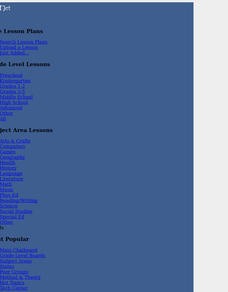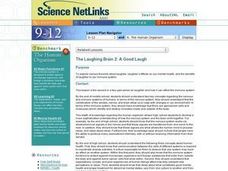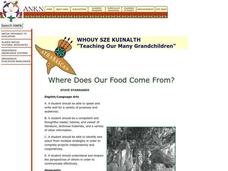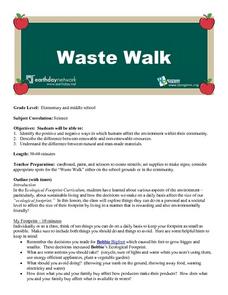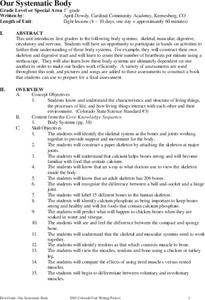Curated OER
The Environment and You
First graders examine the human environmental impact and discover ways to lessen effects. They create a pollution damage flow chart and write down what they think Mother Earth might say. They create inventions from recyclable materials.
Curated OER
The Environment
Students, while engaged in a group discussion, collaborate a mini-project on environmental issues at home and/or in the classroom as well as incorporating environmentally related words and expressions within their daily diary writing...
Curated OER
Pollution
First graders identify and discuss different kinds and sources of of pollution. They explain why it is important to keep the environment free of pollution. They make a poster depicting the dangers of pollution and make litter boxes.
Curated OER
Water Cycle (Grades 2-4)
Students demonstrate their understanding of the water cycle and how it effects the environment by graphically depicting and describing the water cycle.
Curated OER
Adaptations to Environments with Mammals
Fifth graders, after viewing a PowerPoint on different mammals, analyze what a biome is. Then they choose a mammal to research and go outside to feel the grass and leaves and hypothesize about which biome they live in as well as its...
Curated OER
Local Hydrologic Cycle
Students draw the water cycle as it occurs in their community. In this water cycle lesson, students observe demonstrations of sublimation and infiltration. They also use photographs or their own drawings of their...
Curated OER
THE LAUGHING BRAIN 2: A GOOD LAUGH
Students explore various theories about laughter, laughter's effects on our mental health, and the benefits of laughter to our immune system.
Curated OER
Nunavut, Our Communities
Students locate the communities of Nanavut on a territorial map and identify community characteristics. They research the online Atlas of Canada
Curated OER
The Quicker the Better? Food Processing
Sixth graders evaluate the nutrition of various foods. In this healthy eating lesson, 6th graders discuss the processing of many common foods and what this means. Students identify and research unfamiliar ingredients in processed foods...
Curated OER
WHERE DOES OUR FOOD COME FROM?
Students examine the sources, location and availability of local food, develop mapping skills, interact with Elders to gain pertinent information, and examine subsistence issues of the past and present.
Curated OER
How Do Artists Get Their Ideas? Culture and Environment as Sources of Ideas
Students share the difficulties they have in determining what to write or draw for a project. In groups, they view examples from three different artists and discuss how their personal experiences affected their art. They brainstorm a...
Curated OER
A Wild Chain Reaction
Students explore habitats. In this habitat instructional activity, students break into groups and are labeled as a part of a habitat. Students then do an activity with yarn that shows how all of the parts are connected...
Curated OER
The Five Senses - Magic School Bus
Students identify five senses, draw parts of body that relate to each of the senses, hear different sounds in the environment, write those experiences in their journals, and list at least four objects/things that relate to each of the...
Curated OER
Look At Those Leaves!
Students observe and sort tree leaves. In this earth science lesson, students observe the attributes of real leaves and measure leaves using Unifix cubes.
Curated OER
Whale Watcher Game Lesson
Students participate in an online whale watching game. They identify the reasons for migration and describe the route. They make predictions on what would happen if the ways did not migrate.
Curated OER
Forests and Treescapes with Romey Stuckart
Learners discuss Romey Stuckart's painting, "The Cedar," paint a tempera or acrylic picture of a forest or treescape, using overlapping shapes, intense hues, and heavy brush textures, and discuss managed forest techniques preserve...
Curated OER
Angry Words: What Goes Around Comes Around
Learners examine how angry words can effect the people and environment around them and identify ways to cope with angry feelings. They listen to the book Andrew's Angry Words by Dorothea Lachner, and participate in a simulation of how...
Curated OER
Ladybugs
Students read The Grouchy Ladybug by Eric Carle, and explore the life cycle of ladybugs and how they interact with our environment.
Curated OER
Why do we need Vitamin C in our diet? Or Why do we carry old inactive genes in our genome?
Students explore and explain how mutations in the DNA sequence of a gene may be silent or result in phenotypic change in an organism and in its offspring. They analyze how evolution and biodiversity are the result of genetic changes that...
Curated OER
Environment: Waste Walk
Pupils assess the positive and negative affects of humans on the environment. The lesson explores ways in which individuals and societies can reduce the negative impact on the environment. By taking a "waste walk" around their campus,...
Curated OER
Using the Internet to Learn About Marine Life in our Area
Students explore how living things interact with their environment. They research marine life that is studied by Mote Marine Laboratory. Students track sick and injured marine animals. They explore the red tide and the geography of Florida.
Curated OER
Renewing Our Position
Students engage in a lesson in order to analyze the energy needs of the United States and cover the possible future needs depending on the growth of technology. They cover the alternative energy sources and make presentations of the...
Curated OER
Care of the Environment
Students discuss human responsibility towards nature, read story The Man Who Planted Hope and Grew Happiness, take Close to Home quiz to measure their level of commitment to and concern for environment, and discuss ways to be more...
Curated OER
Our Systematic Body
Students explore several parts of the body system in the eight lessons of this unit. Through several hands-on activities, the skeletal, muscular, digestive, circulatory and nervous systems are observed.


